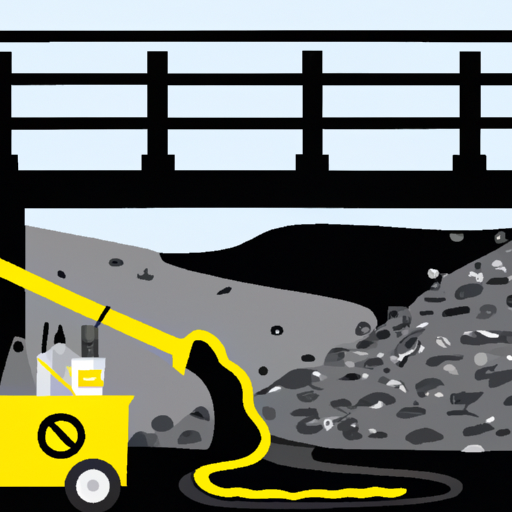This guide explores the environmental impact of road cleaning and provides practical steps on how to clean responsibly. It dives deep into the environmental implications of different cleaning methods, offering insights into sustainable solutions.
"Are You Aware of the Environmental Costs of Traditional Road Cleaning?"
Traditional road cleaning methods may seem harmless on the surface, but the truth is that they come at a significant environmental cost. One of the main culprits is the excessive use of water during the cleaning process. Street sweepers and pressure washers consume massive amounts of water, leading to wastage and putting a strain on local water resources.
Moreover, the chemicals and detergents used in traditional road cleaning can have detrimental effects on the environment. Many of these cleaning agents contain harmful pollutants that can seep into the soil and nearby water bodies, causing water pollution and posing a threat to aquatic life. These chemicals can also find their way into the air we breathe, contributing to air pollution and potentially harming human health.
Another factor to consider is the carbon footprint associated with traditional road cleaning methods. The use of fossil fuel-powered street sweepers and pressure washers contributes to greenhouse gas emissions, exacerbating climate change. The maintenance and operation of these machines also require regular fuel consumption, further adding to their environmental impact.
An illustration depicting the pollution caused by traditional road cleaning methods
"The Green Alternatives: Eco-friendly Cleaning Methods"
When it comes to road cleaning, there are several eco-friendly alternatives that can help minimize the environmental impact. These methods prioritize sustainability and reduce the use of harmful chemicals and excessive water consumption.
- 1. Waterless Road Cleaning:
One innovative approach is the use of waterless road cleaning techniques. Instead of relying on water, these methods utilize specialized equipment and cleaning agents that effectively remove dirt and debris without the need for excessive water usage. This not only conserves water resources but also eliminates the risk of water pollution caused by chemical runoff. - 2. Mechanical Sweepers:
Another green alternative is the use of mechanical sweepers that operate on battery power or renewable energy sources. These sweepers are designed to efficiently collect debris from roads and pavements without the need for water or harmful chemicals. By utilizing renewable energy, such as solar power, these sweepers significantly reduce carbon emissions and contribute to a cleaner environment. - 3. Natural Cleaning Agents:
Many eco-conscious road cleaning companies are turning to natural cleaning agents derived from plant-based ingredients. These agents effectively break down dirt and grime without causing harm to the environment. By replacing chemical-based cleaners with natural alternatives, we can protect water sources, minimize air pollution, and promote a healthier ecosystem.
"Innovative Road Cleaning Technologies: Are They Worth It?"
In the quest for more sustainable road cleaning practices, innovative technologies have emerged that promise to revolutionize the industry. However, the question remains:
are these technologies worth the investment? Let's explore three key aspects to consider when evaluating the worthiness of these innovative road cleaning technologies.
- 1. Efficiency and Effectiveness:
One crucial factor to assess is the efficiency and effectiveness of these technologies. Are they capable of effectively cleaning the roads and removing debris? Do they provide a thorough and comprehensive cleaning? It is essential to evaluate the performance of these technologies to ensure they can deliver the desired results efficiently. Investing in technologies that can streamline the road cleaning process and deliver superior cleaning outcomes can be worth it in the long run. - 2. Environmental Impact:
Another aspect to consider is the environmental impact of these technologies. Do they contribute to reducing carbon emissions? Do they minimize water usage and chemical pollution? It is crucial to prioritize technologies that align with sustainable practices and have a minimal environmental footprint. Investing in road cleaning technologies that help reduce pollution and protect natural resources can be a significant step towards a greener future. - 3. Cost-effectiveness:
Finally, it is important to evaluate the cost-effectiveness of these innovative technologies. While they may require a significant initial investment, it is essential to assess whether they can provide long-term cost savings. Factors such as energy efficiency, reduced water consumption, and lower maintenance costs should be considered when determining the overall value and return on investment.
An image of innovative road cleaning technologies
"How Can You Make a Difference? Personal Responsibility and Road Cleaning"
Taking personal responsibility for road cleaning is a powerful way to contribute to a cleaner and more sustainable environment. By adopting a few simple habits, individuals can make a significant difference in keeping our roads clean.
First, it is crucial to dispose of waste properly. Avoid littering and always use designated trash bins. Whether it's a fast-food wrapper or a plastic bottle, taking a few extra steps to find a proper disposal site can prevent litter from accumulating on the roadsides.
Secondly, consider participating in community cleanup events. Many organizations and local authorities organize initiatives to clean up litter from roads and public spaces. Taking part in these events not only helps clean the roads but also raises awareness about the importance of keeping our environment clean.
Thirdly, educate yourself and others about the environmental impact of road cleaning. Stay informed about eco-friendly cleaning methods and technologies, and spread the word. By raising awareness and sharing knowledge, you can inspire others to adopt responsible road cleaning practices as well.
Additionally, if you notice areas with excessive litter or debris on the roads, report it to the appropriate authorities. Many municipalities have hotlines or online platforms where citizens can report road cleanliness issues. By reporting such problems, you can ensure that the necessary actions are taken to clean up the roads and maintain a clean environment.
Finally, be mindful of your own actions while driving. Avoid throwing items out of your vehicle, secure your loads properly, and be cautious when transporting materials that could potentially fall off and contribute to road debris. By practicing responsible driving habits, you can help reduce the amount of waste and debris that accumulates on the roads.
The Environmental Impact of Road Cleaning: How to Clean Responsibly:
| Cleaning Method | Environmental Impact | Sustainable Solution | Cost |
|---|---|---|---|
| Pressure Washing | Significant water use, runoff can contain pollutants | Reuse water, use biodegradable detergents | High |
| Steam Cleaning | Low water use, non-toxic | Use filtered water, use biodegradable detergents | Moderate |
| Dry Ice Blasting | Low water use, non-toxic | Use filtered water, use biodegradable detergents | High |
| Manual Cleaning | Low water use, non-toxic | Use biodegradable detergents | Low |
Road cleaning is a crucial function for our communities, but it's important to balance this necessity with environmental responsibility. By implementing the practices outlined in this guide, you can contribute to a cleaner, healthier planet while performing this important civic duty.



